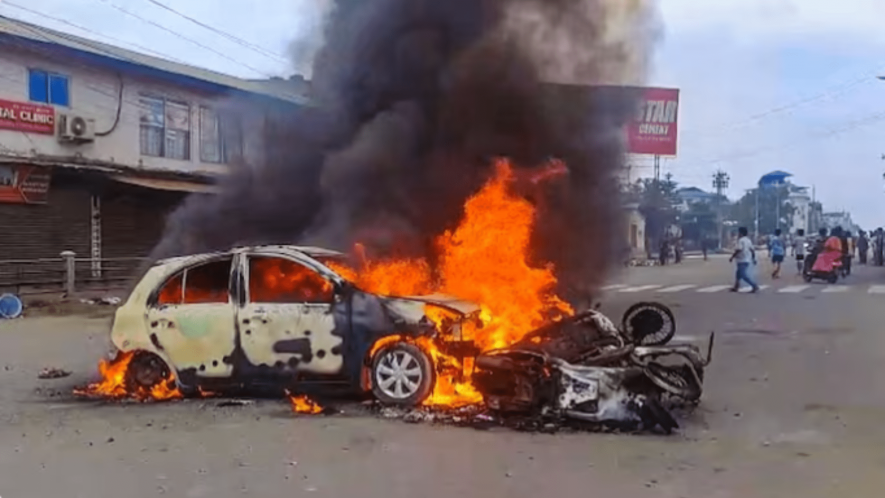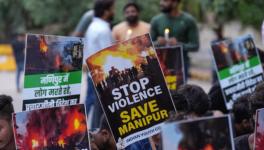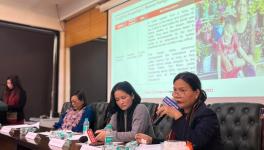Explainer: Why is Manipur Burning?

Vehicles in flames after violence broke out during the 'Tribal Solidarity March' called by All Tribal Student Union Manipur (ATSUM), in Imphal. Image Courtesy: PTI
As the ethnic violence in Manipur continues to smoulder the state, Chief Minister Nongthombam Biren Singh-led government has issued a shoot-at-sight order in “extreme cases”. Meanwhile, there are reports that a BJP MLA, Vunzagin Valte, who belongs to the Kuki community, was attacked by a mob in Imphal on Thursday and is in a critical state. The violence has also reportedly spread to some areas in Meghalaya.
Manipur has a “double engine” government, with BJP ruling in the state as well as the Centre. So, what has led to the violence that has claimed many lives and reportedly displaced over 9,000 people in the state?
The Solidarity March
What triggered the latest violence was a march called on May 3, by the All Tribal Student Union Manipur (ATSUM). The ‘Tribal Solidarity March’ took place in Churachandpur district’s Torbung area. It saw participation by communities including Nagas, Zomis, and Kukis – who comprise more than 40% of the state’s population.
The march came after the Manipur High Court asked the state government last month to send a recommendation to the Centre following a demand for the Scheduled Tribe (ST) status by the Meitei community in the state. The demand for the ST status has been opposed by the tribal communities.
According to reports, thousands participated in the rally and clashes broke out between rival communities. An armed mob allegedly attacked people of the Meitei community, leading to retaliatory attacks in the valley districts, which escalated the violence throughout the state, according to police. The clashes led to vandalism and arson in Torbung that lasted for at least three hours on Wednesday.
There was no let-up in attack or counterattacks over the night. Videos and images showed both Meiteis and tribals purportedly burning tyres and setting fire to houses. A few places of worship were also targeted in the arson, according to reports. Over 500 residents of the Kuki-dominated Langol area in Imphal West fled their homes and are currently staying at the CRPF camp at Lamphelpat, according to reports citing the police. A curfew was imposed in Imphal West, Kakching, Thoubal, Jiribam, Bishnupur, Churachandpur, Kangpokpi and Tengnoupal.
Indian Army sources were quoted as saying that troops and the paramilitary Assam Rifles have evacuated more than 7,500 people from different communities through Wednesday night and Thursday, sheltering them in the troops’ camps and government premises.
Meiteis’ Demand and Tribals’ Opposition
The Northeastern state has been on tenterhooks since February when the BJP government in the state launched an eviction drive that was perceived to be an attempt to target a specific tribal group. The High Court’s direction pertaining to the ST status for the Meiteis was further seen as a threat by the tribal communities.
In March, a violent clash took place in the Thomas Ground in Kangpokpi district where protesters tried to hold a mass rally against "encroachment of tribal lands in the name of reserved forests, protected forests and wildlife sanctuary".
Five persons were injured in that rally following which the Biren Singh government withdrew the tripartite Suspension of Operations (SoO) talks with two Kuki-based militant outfits, Kuki National Army and Zomi Revolutionary Army.
The SoO agreement is a ceasefire arrangement inked by the Centre, state government and Kuki outfits that began more than a decade ago.
In the geographically unique state of Manipur, non-tribal Meiteis primarily inhabit the area around the Imphal Valley – comprising 10% of the state’s landmass, while accounting for over 64% of the state’s population. A majority of the Meiteis are Hindus followed by Muslims.
The hills, on the other hand, make up 90% of the state’s geographical area and are inhabited by more than 35% of recognised tribes. These tribes are largely Christians and are classified into ‘Anya Naga Tribes’ and ‘Anya Kuki Tribes’.
The tribal groups believe that Meiteis have a demographic as well as a political advantage as the community yields 40 out of the total 60 MLAs in the state. Meiteis are believed to be more advanced in many aspects than tribal communities. The latter fear a loss of opportunities if the ST status is granted to the Meiteis. The ATSUM leaders point out that since the language of the Meitei people is included in the Eighth Schedule of the Constitution, many of them have benefits associated with the SC, OBC, or EWS status. The demand, therefore, is being seen as “a tacit strategy of the dominant valley dwellers to make inroads into the hills areas of the state”.
The Meiteis’ demand, on the other hand, rests on the argument that it will help “save the ancestral land, tradition, culture, and language” of the community. The Schedule Tribe Demand Committee, representing Meiteis, started demanding the ST status back in 2012 and its leaders claim that the Meiteis have been kept away from the hulls, while the tribal people can buy land in the “shrinking” Imphal valley.
Eviction Drives
A part of the backdrop of the May 3 violence was formed earlier this year with the government’s “anti-drug drive”. The BJP government in the state had taken to destroying poppy fields, claiming that “illegal settlers” from Myanmar were growing opium and cannabis on government and forest lands. These “settlers” are ethnically related to the Kuki-Zomi people of Manipur. A violent protest took place on March 10 against the eviction of the residents of a Kuki village.
Even as discontent grew over the eviction of the villagers, three churches in Imphal's Tribal colony area were demolished on April 11 for being "illegal constructions" on government land, leading to more discontent.
Several political observers, however, blame the BJP-led state government for initiating the crisis by withdrawing from the 'Suspension of Operations' agreement of 2008 in March that ceased armed operations against Kuki militants. After that, it started evicting forest dwellers in its “drive to end poppy cultivation”, leading to tension and insecurity among the communities living there.
The fear of Kukis and other hill tribes is that their land and forest rights may be taken over.
Incidentally, such was the pressure from the ground that four Kuki BJP MLAs resigned from various posts last month and even went to Delhi to meet the party top brass, demanding the ouster of Biren Singh from the government.
In the latest incident, BJP’s Kuki MLA, Vunzagin Valte, was attacked by a mob in Imphal on Thursday and is said to be in a critical condition.
(with inputs from PTI)
Get the latest reports & analysis with people's perspective on Protests, movements & deep analytical videos, discussions of the current affairs in your Telegram app. Subscribe to NewsClick's Telegram channel & get Real-Time updates on stories, as they get published on our website.
























